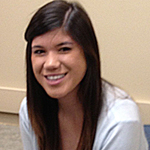 Laurelin Au, a senior English major and ethnic studies minor, has worked in UO’s Writing Lab for two years, and has consulted with hundreds of writers. International students mastering English, novice student-scientists writing lab reports, freshmen revising essays for required composition courses, seniors perfecting personal statements for graduate school, and even graduate students crafting seminar papers—Au gives every writer who walks through the door the best of her attention.
Laurelin Au, a senior English major and ethnic studies minor, has worked in UO’s Writing Lab for two years, and has consulted with hundreds of writers. International students mastering English, novice student-scientists writing lab reports, freshmen revising essays for required composition courses, seniors perfecting personal statements for graduate school, and even graduate students crafting seminar papers—Au gives every writer who walks through the door the best of her attention.
But one common question frustrates her: “Do you think I’m going to get an A?” Indeed, when Au sees writers multiple times and asks about papers she’s consulted on, she usually just gets a letter grade in reply: “‘Oh… I got an A minus.’ Okay, but how did you actually do? What feedback did you get?” Au insists.
It’s not that Au doesn’t understand students’ impulse to see their work in terms of the final grade—it’s that she thinks grades are a way for students and instructors alike to lose site of what really matters in academic writing. “The system seems to define good writing as safe writing—polished, grammatically correct writing that’s in keeping with the instructor’s own views,” Au says. She’s concerned that many students want to focus on eliminating sentence-level errors and getting something on the page that “sounds like” the professor—“I’ve heard that so many times,” she says. “Even I find myself validating my writing by the grading system—if I get a ‘B’ I feel like I did something wrong, even if, when I submitted the paper, I really liked it.”
That’s a shame, says Au, because she wants to approach her papers in a way that reflects her interests and passions. And she’d like the writers she consults to do the same.
“I define ‘good writing’ as writing that authentically reflects your voice, that’s confident and has agency, that might break conventions with a sense of purpose. It’s writing that challenges a reader to think beyond just the assignment—beyond, for example, the article you’re discussing—to get at why something really matters,” she says.
“In my writing, I try to come up with arguments that are original so that I can’t rely too heavily on secondary sources. I don’t want to let other academics’ voices speak for me—I cite sources to facilitate my own ideas, not to echo theirs,” she adds.
The students she meets in the Writing Lab react to her big picture approach with a mix of pleasure and surprise. “I often meet students in the process of writing papers who say, ‘This is so boring to me—I hate this paper.’ Then I say, ‘So how can I help you do something else? Let’s make room for you in this paper, room for you to grow,’” says Au.
Au says that she wishes every UO instructor who teaches with writing could make time for the one-on-one, idea-based conversations with students that she and the Writing Lab tutors have with their peers. She considers those personal conversations the key to students finding authentic entry points into scholarly thinking and academic writing. Academic discourse—sharing knowledge, advancing ideas, making arguments—may seem daunting, but at its core, it’s always first and foremost “human dialogue,” she says.
—Eugene, Oregon May 2013
